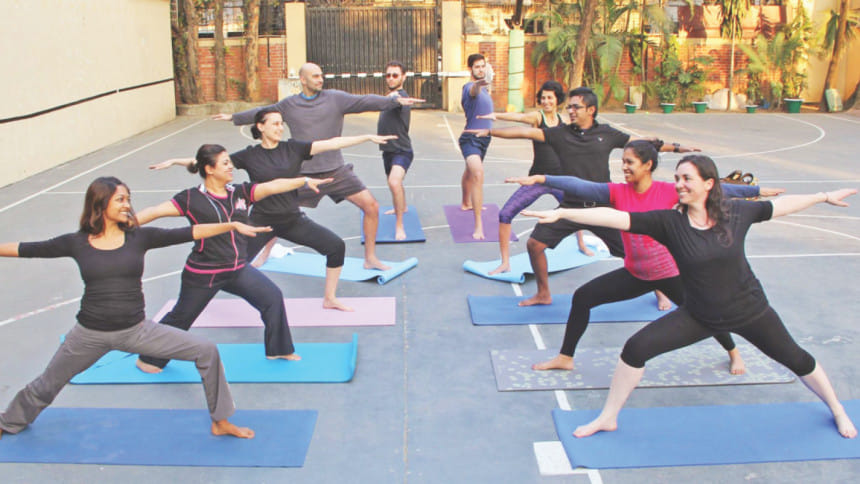Revisiting the benefits of yoga

It has been decided by the United Nations to observe June 21 as International Day of Yoga with record number of countries including Bangladesh supporting the proposal initiated by the Indian Prime Minister Mr Narendra Modi. In United Nations General Council he said, "Yoga is an invaluable gift of ancient Indian tradition. It embodies unity of mind and body; thought and action; restraint and fulfilment; harmony between man and nature and a holistic approach to health and well-being. Yoga is not about exercise but to discover the sense of oneness with ourselves, the world and Nature."
Yoga has been internationally acclaimed as panacea for the humanity effecting harmonious well-being and healing of body and mind. Its gymnastic uses are widely known and its immense therapeutic potentialities in prevention and cure of even incurable diseases have attracted appropriate attention of all concerned.
At the very outset it must be remembered that yoga is neither a religion nor a philosophy. It concerns universal culture of humanity for betterment of performance and quality of living in every aspect. It enables us to connect with limitless dimension of our formless self beyond body and mind and awakens latent potential hidden within us.
The gross aspect of creation including our thoughts is vibratory in nature being manifestation of life force which forms, sustains and transforms everything.
They found that breath is the conveyance of life force and bridge between body and mind. Our entire mental activities like perceiving, thinking, feeling and willing process are intimately dependent on breathing and by concentration, regulation and suspension of the same at will we can go back to our own undifferentiated consciousness.
Nobel laureate quantum physicist Schrodinger thinks that mind, matter and life force are all derived from consciousness which is always experienced in singular and plurality of consciousness is the result of cosmic delusion. Yoga enables us to be united with that cosmic source of ours.
Yogasanas or pranayamas are never physical or breathing exercises being intimately dependent on thinking, feeling and willing with affirmation of mind over body and distribution of life-force to concerned body-parts and mind. To that extent these are far superior to any other exercises. Yoga is free of any side-effect and inexpensive and can be practised by anybody.
Raj yoga or the royal path concerns mastery over mind, emotion, intellect and ego and transcending the fivefold modification of mind like- intellect, emotion, imagination, memory and sleep.
Patanjali explained eightfold limbs of yoga like yama, niyama, asana, pranayama, pratyahara, dhyana and Samadhi. The first two relates to don'ts and do's for self-purification. Asana relates to various postures while pranayam means regulation of life force. Pratyahar means withdrawal of mind from anything at will while dharana and dhyana start with conceptualisation through concentration whereby we may glide into the mystery beyond modifications of mind in Samadhi.
Drop out ego and you are in yoga, stick to ego and you are in bhoga (enjoyment or suffering). Analytical self-inquiry of our true identity, origin, dissolution and purpose can be made through the path of wisdom or Jnana Yoga. Those who are devotional by nature can unconditionally surrender to the Almighty to be driven by universal will through the path of Bhakti Yoga. If we expand our ego by rendering selfless service to the humanity without expecting any reward it becomes Karma Yoga.
Yoga undoubtedly keeps us physically fit and mentally poise through prevention and cure of all ailments. It is the best way for management of stress and human resource development for betterment of performance and quality of living. To the eligible seekers it is a spiritual way to self-realisation. Hence whatever may be our driving motivation or felt necessity we may adopt yoga as the way to fulfilment.
M N Kundu is a columnist and consultant in human resource development. E-mail: [email protected]

 For all latest news, follow The Daily Star's Google News channel.
For all latest news, follow The Daily Star's Google News channel. 



Comments